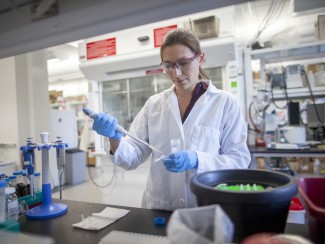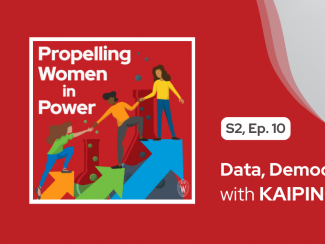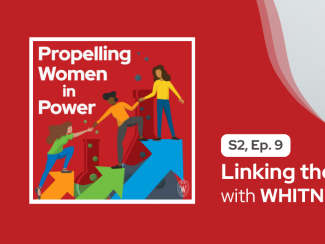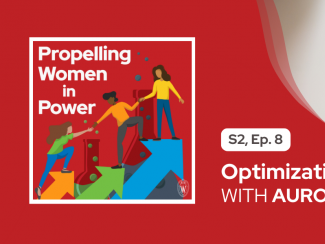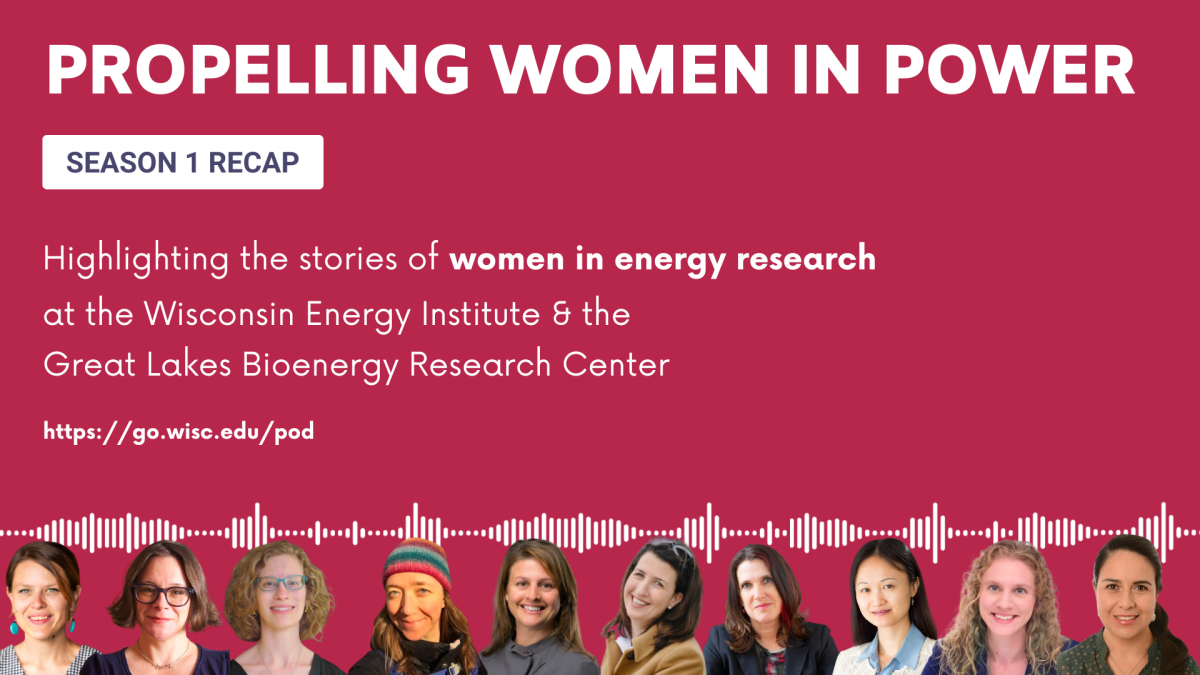
In this short recap of Propelling Women In Power Season 1, we unite the highlights from our conversations with ten amazing women in energy science, who range from nuclear scientists to science communication leaders to microbiological problem-solvers and beyond. Here, we take a look back at their challenges, solutions, and advice to young women in science.
Listen on Spotify, Apple Podcasts, Google Podcasts, Youtube, anywhere you can find podcasts or click below!
Today's episode was hosted by Michelle Chung, communications specialist and former Wisconsin Energy Institute communications intern, and Mary Riker, Wisconsin Energy Institute communications intern.
Editors: Michelle Chung and Mary Riker
Producers: Michelle Chung, and Mary Riker, and Mark E. Griffin, former Wisconsin Energy Insitute communications specialist
Music written and performed by Mark E. Griffin
Transcript
Mary Riker: Hi, I'm Meg Riker, a UW Madison senior undergraduate studying Civil and Environmental Engineering. I'm a science communication intern for the Wisconsin Energy Institute.
Michelle Chung: And I'm Michelle Chung, a communication specialist and former intern at the Wisconsin Energy Institute and the Great Lakes Bioenergy Research Center. And this was Season One of Propelling Women in Power.
Stephanie Diem: My name is Steffi Diem,
Yiying Xiong: Yiying Xiong,
Dominique Brossard: Dominique Brossard,
Stephanie McFarlane: Stephanie McFarlane,
Tracey Holloway: Tracey Holloway,
Adrianna Trusiak: Adrianna Trusiak,
Carolina Cordova: Caro Cordova,
Natalia De Leon: Natalia De Leon,
Audrey Gasch: Audrey Gasch
Ashely Shade: Ashely Shade.
Mary Riker: The women we have interviewed over the course of this first season are amazing researchers and scientists who are contributing to their fields and the future of sustainable energy in our changing world. They are renowned for their commitment to research their supportive their students, and their teaching of the next generation. Through their work as scientists, they are inspiring this next generation to face scientific challenges head on. By sharing their stories as women, they're helping develop a fairer and more equitable scientific fields in the future.
Michelle Chung: I'm so grateful we got to interview these amazing women. They shared so candidly with us about their experiences. We learned so much from our conversations this season. Meg, what were some things that stood out to you?
Mary Riker: There's a lot that is changing for women in energy science. So many of our guests have noted that there are more women in their fields than there were even 10 years ago. But, there's still implicit sexism and institutional structures that make it hard for women to succeed in STEM. Here's what our guests had to say.
Natalia De Leon: There is progress that needs to be made. But there is a lot of unconscious biases, being sitting in a room and making that comment, and then somebody else making the same comment and my comment was ignored is a pretty common thing. It takes more work. I feel like I, you know, I could have moved through things faster or better, less painfully, if I wasn't a woman.
Dominique Brossard: Academia is a very sexist environment. And it's much better now than it used to. But look, we are 16 departments in CALS, and there's only two women that are chairs. Among all the professors at UW, only 20% are full professors, that are women.
Tracey Holloway: For a while the National Science Foundation required that if you wanted to take a postdoc funded by the National Science Foundation, it had to be at a different institution than where you did your PhD. And you know, there's a there's a good reason for this. Because as scholars grow, it's helpful to have different mentors and different communities. Maybe do your undergraduate at one place and your graduate school at a different place and do a postdoc at a third place. If you're requiring that someone move their entire life up across the country, when they start graduate school, when they start a postdoc two years later, maybe for another postdoc two years later for maybe a temporary position. These kinds of huge life movements are especially disruptive for families, or if you plan to have kids and just the way the biological clock maps on to the PhD clock. Women are more disadvantaged by these procedures.
Ashley Shade: It's a big myth to tell women that they can have a career and they can have a family. And both can be great. Because there are these issues that pandemic has shown us that actually make it very hard to do those things.
Stephanie McFarlane: I was in my program for a year after I had my first child and I found the balance to be really difficult and didn't quite have the support structure I needed at the time to be able to finish my degree. So I actually I stopped my PhD at that time.
Yiying Xiong: Also, one of the biggest struggles I've had in my personal professional experience is the lack of flexibility. When women have family have kids, it comes with a lot of responsibilities. And sometimes there's conflict between work and family.
Michelle Chung: We need to make institutional changes to support caregivers, marginalized people, first generation college students, the people that face a lot of these barriers to finding success in STEM. Some of our guests had many potential solutions to these issues both system wide and and how they cultivate their own communities.
Tracey Holloway: In an organization where there are a lot of unwritten rules, that benefits the majority group, maybe because they're, you know, subliminally or explicitly helping each other going out to get lunch together or chatting in ways that that underrepresented groups aren't included in.
Natalia De Leon: In order to promote women and minorities, we are having them participate more in activities, and it's a huge responsibility. So first of all, when I invite some of somebody from some for something, I always start by saying, it is totally okay to say, no, I want you to feel like it is your right. I'm inviting you, because, you know, I would love to have you participate. But please feel free to say no. The other thing is that I try as much as possible to figure out ways to compensate people for that effort.
Ashley Shade: Providing full time childcare for elementary aged students in the summertime. Because faculty in the sciences don't shut down their labs in the summer, they're still managing their teams and advancing their science. So having a reliable, affordable, high quality place on campus, where children can go and be enriched and be cared for, while scientists have the space and the time to pursue their research program and support their labs.
Mary Riker: And so many of our guests had great advice that they've learned on their own paths, prioritizing your own balance and values, mentoring and speaking up.
Ashley Shade: To just check in and ask yourself: does this opportunity align with these values and these goals that I have for myself? And if the answer is not obviously yes, don't feel obligated to take that opportunity.
Stephanie McFarlane: Instead of worrying about the job or being everything you can or like, being what people expect you to be, be who you want to be, do the amount of work that you want to do that sustainable for you, and do it the best you can. And if it doesn't work out, or if it's not enough, then that's not the right job for you. But I think that by just having that attitude, it can be enough.
Stephanie Diem: Continuously updating my resume, or my CV, because those are objective things that I have done that no one can take away from me. And so reminding yourself of what you've done to get this far, I think helps a lot.
Audrey Gasch: Focus on the process. Perfection is, is actually not part of the process.
Adrianna Trusiak: Ultimately, sticking together and sharing experiences makes us relatable to each other that we're both going through the same things and having the same feelings or dealing with the same issues.
Michelle Chung: This was such a good season, we would like to thank all of our guests and all of you listening in. We hope that in these women's stories, everyone can learn something about finding your own career path, the changes we need to make our fields more inclusive, and how we can do our best to lead the way for others.
Mary Riker: Please subscribe, rate, review and share this podcast with a friend. You can find the Wisconsin Energy Institute at energy dot wisc dot edu and you can find the Great Lakes Bioenergy Research Center at G L B R C dot O R G. Thanks for tuning in. We'll see you next time on Propelling Women in Power Season Two.

